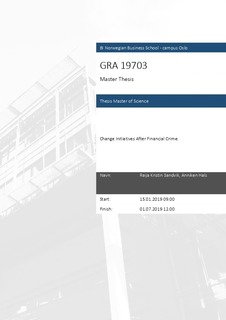Change Initiatives After Financial Crime.
Master thesis
Permanent lenke
http://hdl.handle.net/11250/2624807Utgivelsesdato
2019Metadata
Vis full innførselSamlinger
- Master of Science [1621]
Sammendrag
Financial crime poses a threat to organizations around the world, necessitating
robust internal frameworks to counter applicable risks adequately. Furthermore,
financial crime puts an affected organization in distress, causing a series of effects
towards rebuilding the status quo. With a change management perspective, we
argue that there is an increased necessity for organizations to prevent, detect, and
respond to financial crime. As the risk of financial crime is increasing, this thesis
aims to contribute to the discussion on change management after financial crime by
answering the research question
How should change management be initiated after financial crime?
By using a thematic analysis of primary and secondary data, our study revealed four
interesting areas for discussion. These areas allowed us to compare, contrast, and
criticize the information gathered within the dimensions of (i) culture; (ii) prevent;
(iii) detect; and (iv) response. All areas include diverse change initiatives our
research found essential for organizations to evaluate in order to mitigate the risk
of financial crime reoccurring. By addressing a gap in literature, we recommend
seven change initiatives for organizations to initiate after an incident of financial
crime. Further, our study contributes to the theory of convenience as we discuss
how certain change initiatives might reduce or eliminate an offender’s financial
motive, organizational opportunity, and personal willingness to conduct financial
crime.
It is our hope that this study can contribute to the further understanding of
change management after financial crime, as we deem the study of change
initiatives after financial crime to be of great societal and organizational value.
Keywords: Change Management, Financial Crime, Culture, Prevent, Response,
Detect, Transparency, Trust, Measures, Convenience Theory
Beskrivelse
Masteroppgave(MSc) in Master of Science in Business, Leadership and Change - Handelshøyskolen BI, 2019
